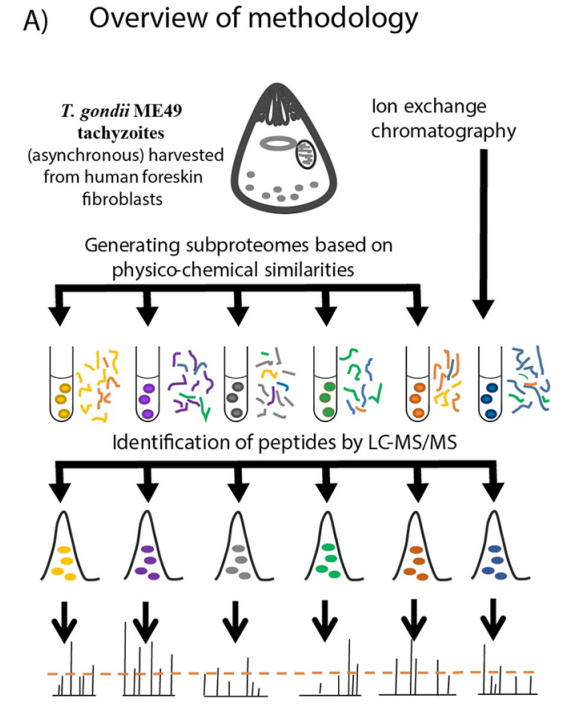|
Research Article Cites and NRicher™ and Cleanascite™ in Map of Protein-Protein Interactions Biotech Support Group reports on a research article, describing the simplicity and efficiency of their differential proteomic enrichment technology to observe and annotate multiprotein complexes in Toxoplasma gondii, a major food borne pathogen.
News
Release
Research
Article Cites and NRicher™ and Cleanascite™ in Map of
Protein-Protein Interactions
MONMOUTH
JUNCTION, NJ
, June
27, 2024 -- Biotech Support Group reports on a research article,
describing the simplicity and efficiency of their differential
proteomic enrichment technology to observe and annotate multiprotein
complexes in
Toxoplasma
gondii
, a major food
borne pathogen
.
Swapna
LS, Stevens GC, Sardinha-Silva A, Hu LZ, Brand V, Fusca DD, et al.
(2024
)
ToxoNet: A high confidence map of protein-protein interactions in
Toxoplasma gondii.
PLoS Comput Biol 20(6): e1012208. https://doi.org/10.1371/
journal.pcbi.1012208
“
I
am very pleased that two of our products were able to contribute to
this rigorous examination of protein complexes. When comparing the 5
different subproteomes, there is clearly different selection biases
amongst the 5 surface chemistries. Also, many of the proteins
observed from the NRicher™ beads, were not observed in the Ion
exchange fractions demonstrating the importance of combining
different modes (ionic, hydrophobic, etc.) of separation to alter
selection properties, and consequently improving overall proteome
coverage. This further validates that the sub-proteome bias
characteristics of the NRicher™ platform can simplify complex
proteomes into differentiated sub-proteomes with efficiencies
suitable for deep functional proteome characterization. These
features help in applications such as this whereby coverage is most
important, but also in targeted applications whereby specific
enrichment is most important.” states Swapan Roy, Ph.D., President
and Founder of Biotech Support Group.
For more information on the NRicher™ platform, visit: https://www.biotechsupportgroup.com/NRicher-s/329.htm
For
more information visit:
Cleanascite™
Lipid Removal Reagent and Clarification,
at
Keywords:
NRicher™,
protein-protein interactions, subproteome enrichment, Cleanascite™,
Toxoplasma
gondii
About Biotech Support Group LLC
Converging
with cultural and technological disruptions forthcoming in
healthcare, Biotech Support Group develops methods for cost effective
and efficient sample prep essential for these expanding markets.
Following a tiered business strategy, the company continues its
growth in the consumable research products area supporting the
rapidly expanding installation of LC-MS instrument and computational
infrastructure.
For
this market, key products include: AlbuVoid™ and AlbuSorb™ PLUS
for
albumin & IgG depletion, Cleanascite
™
for lipid adsorption, HemogloBind™ and HemoVoid™ for hemoglobin
removal, and NRicher™ for targeted proteomics and family specific
proteome enrichment.
For more information, go to http://www.biotechsupportgroup.com. For Business Development , contact: Matthew Kuruc 732-274-2866, mkuruc@biotechsupportgroup.com
|

- About
- Products
- Hemoglobin Removal Kits
- Lipid Removal & Clarification
- Urine Protein & Low Abundance Enrichment
- Class Specific Enrichment
- Sample Prep Mass Spectrometry
- Functional & Chemical Proteomics
- Genomic Sample Prep
- Accessories
- Technical Resources
- References
- Publications & Reports
- FAQs
- Case Studies
- Cleanascite™ Unlocks Insights into Lipid-Driven Tumor Immunosuppression
- NRicher™ Bead Platform Provides Unique Sub-Proteome Biases And Fit For Purpose Opportunities for Targeted LC-MS Quantification
- BSG Products To Assist in Analyzing Macrophage Polarization
- Ectodomain Shedding and Enrichment of the Soluble Membrane Proteome
- Investigate out of the Venn Diagram box
- Methods to selectively deplete or purify Hemoglobin from Dried Blood Spots (DBS)
- The Utility of HemoVoid™ is Demonstrated in 3 Proteomic Investigations Identifying Potential Disease Specific Biomarkers
- The 4 common features of our sample prep products, known as the BSG Advantage, are highlighted in a selection of journal references.
- AlbuVoid™ Workflows Advance Cell Secretome Proteomics
- Lipid Removal for Phenotypic Cell Response in Cancer Research
- The Influence of Sample Prep Bias on LC-MS Targeted Peptide Quantification in Serum Proteomics
- Re-imagining proteomics for developing precision medicine biomarkers of the innate immune response in SARS-CoV-2
- Patent Application Describes New Proteomic Methods to Monitor Protease Inhibitor Function During Covid-19 Infections
- Efficient Hemoglobin Removal Advances Red Cell Proteomics Offering Many New Insights Into Inflammation and Infectious Disease
- The Potential for New Blood Biomarkers in the Management of COVID-19 Disease
- Establishing the Utility of HemoVoid™ and HemogloBind™ as Enrichment Tools for Proteomic Analysis of Red Cells and Whole Blood in Parkinson’s Disease
- Species Diversity Supported By BSG Products
- Poster Report Describes Loss of Functional Serpin Activity In Cancer Patient Blood
- AlbuVoid™️ PLUS & AlbuSorb™️ PLUS Evaluating Different Windows of Observation Solves The Many Challenges of Serum Proteomics
- Tackling the Challenges of Serum Proteomics
- Lipid Removal Sample Prep for Cell Response Applications
- Sample Prep for Proteomic Analysis of Saliva
- Biotech Support Group Featured in Book, "Functional Proteomics – Methods and Protocols"
- Sample Prep Liquid Biopsy Products Suitable for Proteomic Profiling of a Variety of Body Fluid Sample Types
- Albumin and High Abundance Depletion
- Using HemogloBind™ as a Hemoglobin Binding Reagent
- Diverse technologies available for researchers to selectively bind or enrich exosomes and extracellular vesicles.
- Stroma Liquid Biopsy™ Biomarkers Profile Pan-Cancer Dysregulation of the Serum Proteome
- Diverse Depletion and Enrichment Technologies Enhance Simplicity and Efficiency of Obtaining Quality Proteomic Information
- Use On-Bead Digestion to Improve Time Required for Serum Digestion
- Using AlbuVoid™ as a Serum Protein Enrichment Kit in Functional Proteomics
- Using Cleanascite™ as a Lipid Absorption and Clarification Reagent
- Using HemoVoid to Remove Hemoglobin Before Analysis
- Blog
- Contact
- Liquid Biopsy
 The
apicomplexan intracellular parasite
Toxoplasma
gondii
is a major food borne pathogen that is highly prevalent in the global
population. The majority of the
T.
gondii
proteome remains uncharacterized and the organization of proteins
into complexes is unclear. To overcome this knowledge gap, a
biochemical fractionation strategy was used to predict interactions
by correlation profiling.
The
apicomplexan intracellular parasite
Toxoplasma
gondii
is a major food borne pathogen that is highly prevalent in the global
population. The majority of the
T.
gondii
proteome remains uncharacterized and the organization of proteins
into complexes is unclear. To overcome this knowledge gap, a
biochemical fractionation strategy was used to predict interactions
by correlation profiling.